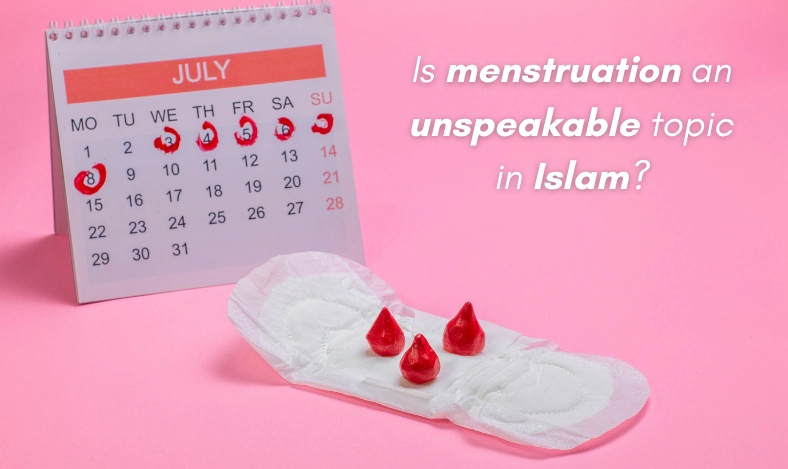Question
I have a question regarding menstruation in Islam. Is it permissible to discuss this topic openly with our brothers and father? Additionally, is it acceptable to refrain from pretending to fast when we are unable to do so due to menstruation? Is menstruation considered a censored subject in Islamic discourse?
Answer
Salaam,
Thank you for reaching out with your inquiry.
Menstruation is not regarded as a source of shame in Islam. The Qur’an explicitly addresses menstruation and outlines its associated rulings. The prevailing cultural taboo surrounding open discussions on this subject within families is a social construct rather than an Islamic directive. This stigma, which has been imposed on Muslim societies, has resulted in unnecessary difficulties for many women—an outcome that is incongruent with the spirit of Islam.
Numerous hadith reports illustrate the openness with which the Prophet Muhammad (peace be upon him) addressed matters related to menstruation. One such example is found in Tabaqāt al-Kubrā, where Umayyah bint Qays (may Allah be pleased with her) narrates her experience:
فخرجنا معه وكنت جارية حديثا سني فأردفني رسول الله صلى الله عليه وسلم حقيبة رحله فنزل إلى الصبح فأناخ وإذا أنا بالحقيبة عليها أثر دم مني وكانت أول حيضة حضتها فتقبضت إلى الناقة واستحييت فلما رأى رسول الله ما بي ورأى الدم قال لعلك نفست قلت نعم قال فأصلحي من نفسك ثم خذي إناء من ماء ثم اطرحي فيه ملحا ثم اغسلي ما أصاب الحقيبة من الدم ثم عودي ففعلت فلما فتح الله لنا خيبر رضخ لنا من الفئ ولم يسهم لنا وأخذ هذه القلادة التي ترين في عنقي فأعطانيها وعلقها بيده في عنقي فوالله لا تفارقني أبدا فكانت في عنقها حتى ماتت وأوصت أن تدفن معها
“… Then we set out with him. I was a young girl, and he made me sit on his she-camel behind the luggage. I later noticed that the bag had traces of blood from me. It was the first time I had experienced menstruation. Feeling embarrassed, I moved forward on the camel to conceal it. When the Messenger of God (peace be upon him) observed my discomfort and saw the traces of blood, he inquired, ‘Have you begun menstruating?’ I replied, ‘Yes.’ He then instructed me: ‘Attend to yourself. Take a container of water, add salt to it, and cleanse the affected part of the bag. Then return.’ I followed his guidance. When God granted us victory at Khaybar, the Prophet took this necklace that you see on my neck, gave it to me, and placed it on me with his own hands. By God, it will never part from me.” She wore the necklace throughout her life and requested that it be buried with her.”
(Tabaqāt al-Kubrā, Volume 8, Entry 4245)
This account presents a young girl experiencing her first menstrual cycle while traveling, surrounded by men, including the Prophet (peace be upon him). His response was neither one of discomfort nor avoidance; rather, he engaged with the situation directly and compassionately, providing guidance on purification without causing her further embarrassment. Notably, he did not instruct her to withdraw from the group but instead reassured her and made her feel valued by gifting her a necklace.
While it is not necessary for women to make public announcements about menstruation, there should be no sense of shame in discussing it within the family. Modesty is a virtue, and it is understandable that women may feel reserved when discussing such matters with their fathers and brothers. However, men should also be informed about these natural biological processes so they can support the women in their families appropriately. If a woman is unable to fast or pray due to menstruation, she should feel comfortable communicating this without concealing it.
Moreover, educating young men about menstruation fosters a respectful and understanding attitude toward their sisters and other women. Such awareness reduces the likelihood of insensitive inquiries and prevents the perpetuation of stigma. It is crucial to cultivate an environment where boys are taught never to mock or trivialize menstruation, as doing so can lead to anxiety and self-consciousness among girls.
Regards,
Mushfiq Sultan
Al-Mawrid








